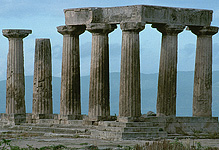
Apostle Saint Paul travels to Thessalonica, Athens and Corinth
Acts 17, 1- 4
Now when they had passed through Amphipolis and Apollonia, they came to Thessalonica, where was a synagogue of the Jews: And Paul, as his manner was, went in unto them, and three sabbath days reasoned with them out of the scriptures, Opening and alleging, that Christ must needs have suffered, and risen again from the dead; and that this Jesus, whom I preach unto you, is Christ. And some of them believed, and consorted with Paul and Silas; and of the devout Greeks a great multitude, and of the chief women not a few.
Acts 17, 16 - 27
Now while Paul waited for them at Athens, his spirit was stirred in him, when he saw the city wholly given to idolatry. Therefore disputed he in the synagogue with the Jews, and with the devout persons, and in the market daily with them that met with him. Then certain philosophers of the Epicureans, and of the Stoicks, encountered him. And some said, What will this babbler say? other some, He seemeth to be a setter forth of strange gods: because he preached unto them Jesus, and the resurrection. And they took him, and brought him unto Areopagus, saying, May we know what this new doctrine, whereof thou speakest, is? For thou bringest certain strange things to our ears: we would know therefore what these things mean. (For all the Athenians and strangers which were there spent their time in nothing else, but either to tell, or to hear some new thing.) Then Paul stood in the midst of Mars' hill, and said, Ye men of Athens, I perceive that in all things ye are too superstitious. For as I passed by, and beheld your devotions, I found an altar with this inscription, TO THE UNKNOWN GOD. Whom therefore ye ignorantly worship, him declare I unto you. God that made the world and all things therein, seeing that he is Lord of heaven and earth, dwelleth not in temples made with hands; Neither is worshipped with men's hands, as though he needed any thing, seeing he giveth to all life, and breath, and all things; And hath made of one blood all nations of men for to dwell on all the face of the earth, and hath determined the times before appointed, and the bounds of their habitation; That they should seek the Lord, if haply they might feel after him, and find him, though he be not far from every one of us:
Acts 17, 32 - 34
And when they heard of the resurrection of the dead, some mocked: and others said, We will hear thee again of this matter. So Paul departed from among them. Howbeit certain men clave unto him, and believed: among the which was Dionysius the Areopagite, and a woman named Damaris, and others with them.
Acts 18, 1- 8
After these things Paul departed from Athens, and came to Corinth; And found a certain Jew named Aquila, born in Pontus, lately come from Italy, with his wife Priscilla; (because that Claudius had commanded all Jews to depart from Rome:) and came unto them. And because he was of the same craft, he abode with them, and wrought: for by their occupation they were tentmakers. And he reasoned in the synagogue every sabbath, and persuaded the Jews and the Greeks. And when Silas and Timotheus were come from Macedonia, Paul was pressed in the spirit, and testified to the Jews that Jesus was Christ. And when they opposed themselves, and blasphemed, he shook his raiment, and said unto them, Your blood be upon your own heads; I am clean: from henceforth I will go unto the Gentiles. And he departed thence, and entered into a certain man's house, named Justus, one that worshipped God, whose house joined hard to the synagogue. And Crispus, the chief ruler of the synagogue, believed on the Lord with all his house; and many of the Corinthians hearing believed, and were baptized.

#01010220
Landscape near the Isthmus of Corinth,where,according to Greek myth,the robber...

#01010332
Lechaion Street in Corinth. View towards Acrocorinth...

#01010333
Lechaion Street in Corinth. View towards Acrocorinth...

#01010334
Temple of Octavia, Corinth. Early Roman imperial.

#01010335
The Bema, the Court of Justice on the Forum of Corinth. Saint Paul preached he...

#01010336
The Bema, the Court of Justice on the Forum of Corinth (550 BC...

#01010337
Baths of Eurycles in Corinth. Roman Imperial.

#01010338
Temple of Apollo in Corinth (550 BCE).

#01010523
Temple of Athena Nike on the Acropolis.

#01010528
The Parthenon, Temple of Athena (5th BCE). Acropolis, Athens, Greec...

#01010529
The Acropolis seen from the Areopag (highest tribunal) Athens, Greece

#01010537
Bema of Corinth. The bema was always on the agora of of a town. When Saint Pa...